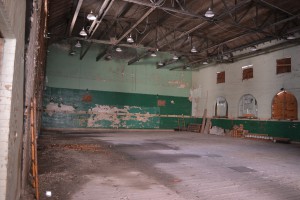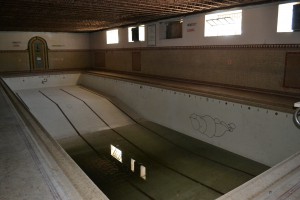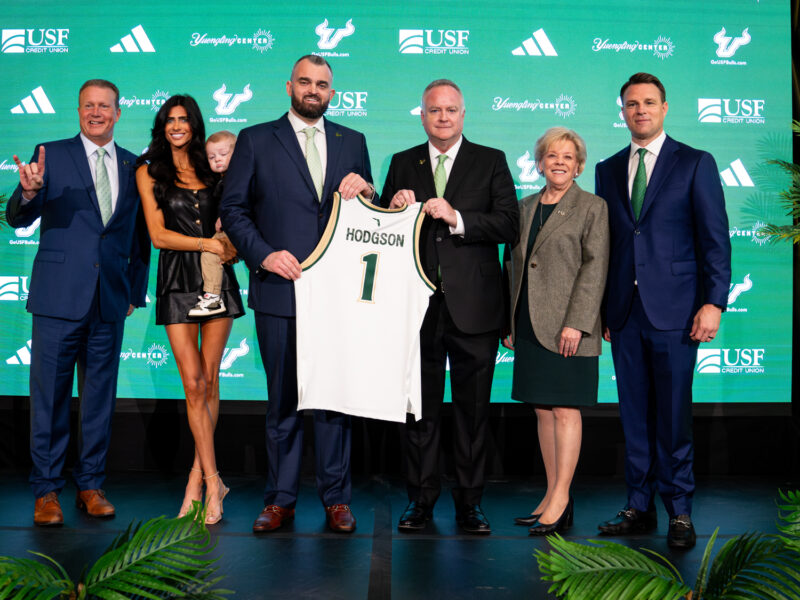
Imagine a Willy Wonka who craved concerts over confection, and built his factory to suit. Thomas Nestor and Eric Ihlenfeldt, two St. Petersburg music enthusiasts, have just such a dream, and have started a collective called Historic St. Pete Inc. to see it through.Trying to obtain the building that they plan to use has been the biggest struggle. The Historic YMCA on First Avenue South and Fifth Street South was built in 1926 with $550,000 of community funds, and remained opened from 1927-2000. Since closing it has been in the hands of various property managers. It is in danger of being demolished or sold to private interests, but Nestor and Ihlenfeldt want to return the building to the community.
Their “music mansion” concept would repurpose the roughly 52,000-square-foot building as a music conservatory of sorts. It would include an education center, a recording studio, a radio station and a concert venue.
“So hypothetically we could take a kid that’s never played, teach him, record him, put him on the air and then have him open for a big act,” said Nestor, who is a music promoter by trade. “All of the parts will complement each other.”
They also plan on offering their education programs with a “pay what you can, or don’t pay anything” philosophy.
“The political sentiment seems to be that we should just cut art programs, but that’s tragic from an education standpoint,” said Ihlendfelt. “It all stems around early education. It’s important to develop the music language as soon as possible.”
The venue would be roughly House of Blues-sized, with room for about 2,000 people. The concert hall will be installed where the gym once was, and will require knocking out a wall. There will also be private VIP quarters for visiting musicians and artists. One of the main rooms would be converted into a gallery with digital walls used to display images, movies or advertisements during events. When no events are planned, the venue will be available for community and special event rentals.
According to Nestor, the center would essentially be everything creative for all ages – “kidfriendly by day and a speakeasy by night.”
Preserving the site’s Mediterranean Revivalist architecture is another big selling point for the project. The Historic YMCA is one of only four remaining buildings in St. Petersburg in the style, and it was recently designated number seven on the “11 Most Endangered Historic Sites” by the Florida Trust for Historic Preservation.

the venue by night.
The style was popular after World War I, and reflects the spirit of internationalism at that time. Mayan, American Indian, English and Spanish elements are combined in a minimal fashion. Nestor thought that it was a mish-mash of different influences when he first toured the building, but came to learn that it was eclectic on purpose.
“If all those cultures had gotten together in real life it would like be a Quentin Tarantino movie,” Nestor said. “I want to purchase it and return it to its 1926 glory. We would bring back the stone look and restore everything.”
The St. Petersburg City Council also voted 8-0 in favor of allowing them to pull up the asphalt around the building and put down traditional Augusta block, as well as doing some substantial landscaping. The councilmembers are very supportive of the venture, though they have offered no financial assistance.
Until a couple weeks ago, Historic St. Pete’s chances of even attaining the building were in jeopardy. They had been unsuccessful in finding enough donors to gather the $1.25 million needed to purchase it. Thanks to seven anonymous donors that Nestor refers to as “angels,” they were able to pay the $8,000 lease every month so that the property manager wouldn’t sell the building to any of the other interested parties. Other proposed plans for the building include a law firm, doctor’s offices, condominiums and a private house.
Now, a construction and development company from Tampa has approached them with interest in the project, and they want to help Historic St. Pete Inc. purchase the building. Up until this point, every group they have talked to wanted to change their business model too much for comfort. After final negotiations are made between the two parties, they will close on the building in September.
The challenge of keeping control of the building was “like having sharks and snakes circling my feet for the property,” Nestor said, and he is looking forward to having that part of the process behind him.
He said that their model is best because it is the only one that will keep the building open to and involved with the community.
“We had no clue how much this building meant to people,” Nestor said. “I had a guy tell me he used to stay here in 1940 for 50 cents, and others basically grew up here.”
If the deal goes through, the next hurdle will be raising millions of dollars for restoration. Ihendfelt and Nestor are considering all kinds of fundraisers and black tie events. They will resume giving Saturday tours of the property once the weather is cooler. It will close at the end of the year, and construction will start in January.
In the meantime, they are looking for all the contributions they can get, financial and otherwise.
This week they will launch an Indiegogo crowd-funding campaign asking for $95,000. Half of the amount raised will go to early music education, and the other half to awareness and promotion of the project.
They are also seeking volunteers and idea-makers to help make their pipe dream a reality.
Historic St. Pete Inc. is on Facebook and online at historicstpete.org.


